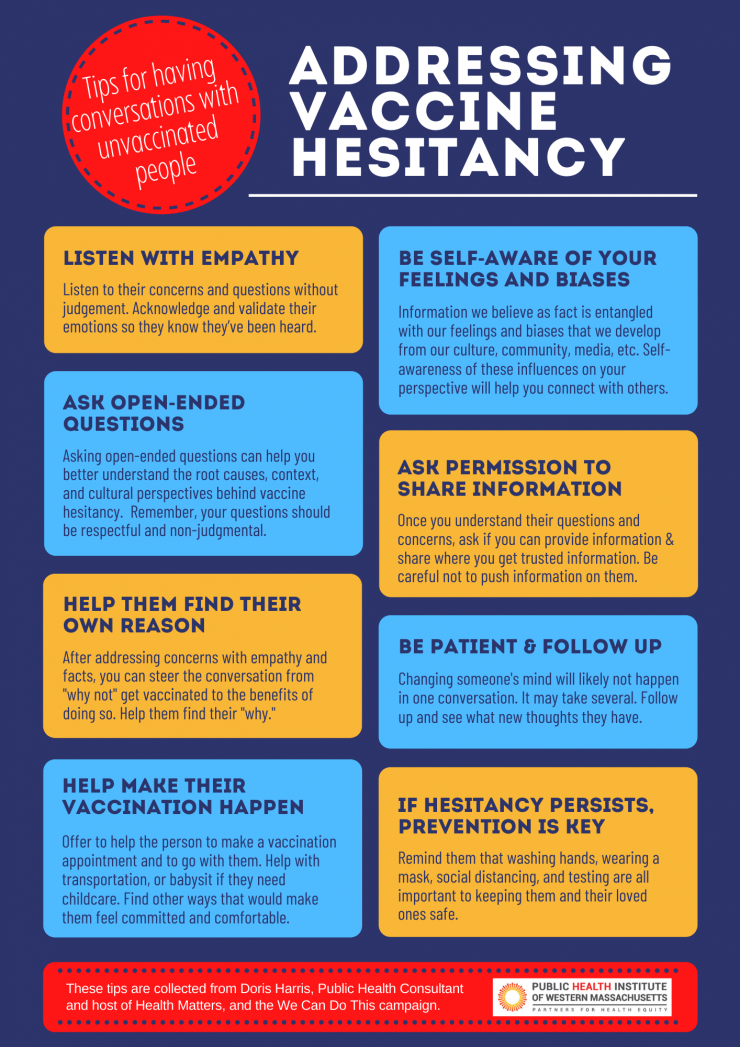Some people are hesitant about getting the COVID-19 vaccine. Misinformation, mistrust in healthcare and government systems, lack of information, logistical barriers, and inequity are some of the factors that contribute to these feelings of hesitancy and resistance. It can also be hard to have helpful and compassionate conversations when people have opposing views of the vaccine. The pandemic has impacted everyone’s life, but it can be felt and understood differently. The politicization of the pandemic has also polarized many issues related to it.
Conversational Tips with People who are Unvaccinated
If you know someone who is hesitant or resistant to getting vaccinated, follow these tips when having a conversation. These tips are created with advice from Doris Harris, Public Health Consultant and host of Health Matters, and the We Can Do This campaign.
1. Listen to their questions with empathy
It’s normal for people to have questions or not know where to go for information. The amount of information (and misinformation) can be overwhelming. Help by listening without judgement. Listen carefully so you can start identifying the root of their concerns. Acknowledge and validate their emotions so they know they’ve been heard.
2. Show self-awareness of your feelings and acknowledge bias
Make sure you recognize your own emotions and feelings, especially when talking with a friend or family member. We all have bias which is ingrained in us through our culture, community, family/friends, media, and other outlets each person is attuned to.
3. Ask open-ended questions to explore their concerns
Open-ended questions are meant to elicit more than a yes/no answer. Asking open-ended questions can help you understand what your friend or family member is worried about, where they learned any troubling information, and what they have done to get answers to their questions. Do not be judgmental and respectfully ask questions that help you understand their concerns. Avoid saying things like, "Why would you be worried about that?". There is a natural fear that many people have, that can be rooted in historical injustices and abuses by the medical community against black and brown people. Also, avoid criticizing their information sources, rather cite your own experience and point them to high quality sources.
4. Ask permission to share information
Once you understand their question or concern, ask if you can provide some information and tell them where you get information you trust. Be careful not to push information on them. Talk with the person, not at the person. If you don’t know the answer to their questions, consider offering to help look for information or suggest they contact their trusted doctor.
5. Be patient and follow up
You may not change someone’s decision in one conversation. It may take several conversations over time. Remain patient and approachable about the subject. Follow up to ask how they are doing and what new thoughts they have about vaccination.
6. Help them find their own reason to get vaccinated
Everyone who chooses to get vaccinated does it for a reason—to protect their family, to protect their children, to be less anxious, to visit their parents, or to get back to activities like seeing friends, resuming work, or returning to school. After addressing concerns with empathy, respect, and facts, you can steer the conversation from "why not" get vaccinated to the benefits of doing so. Help them discover their “why”. You might consider sharing your own reasons for getting vaccinated. Emphasize how protecting ourselves, is connected to protecting our families, and our communities.
7. Help make their vaccination happen
Once someone decides on their "why," help make the path to vaccination shorter, easier, and less stressful for them. Offer to help your family member or friend make a vaccination appointment at a location nearby and, if needed, go with them to the appointment. Offer to help with transportation or to babysit if they need childcare. Or find other ways that would make them feel committed and comfortable.
8. If someone will not consider vaccination, prevention strategies are key
Remind people to wash hands, wear a mask, social distance, and test if symptomatic or had contact with someone with COVID. These are still important to keep them and their community safe, especially if they won’t seek vaccination. It’s important to protect yourself in order to protect others. Encourage people to do self-care in addition to preventive health care strategies. Empathize how the pandemic has impacted mental health, physical health, spiritual health, and social connections.


